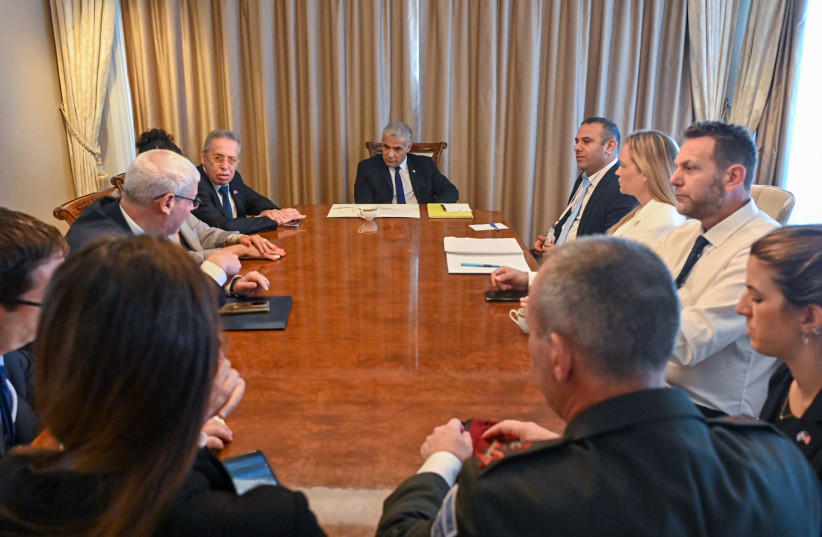
This article is more than
3 year old
The US reaffirmed that it is prepared to use military force to stop Iran from attaining a nuclear weapon, in the Jerusalem US-Israel Strategic Partnership Joint Declaration US President Joe Biden and Israeli Prime Minister Yair Lapid were set to sign after their meeting on Thursday.
The United States stresses in the Jerusalem Declaration “that integral to this pledge” - a commitment to Israel’s security and qualitative military edge - “is the commitment never to allow Iran to acquire a nuclear weapon and that it is prepared to use all elements of its national power to ensure that outcome.”
Following his meeting with Biden, Lapid said that “the only thing that will stop Iran is knowing that if they continue to develop their nuclear program the free world will use force. The only way to stop them is to put a credible military threat on the table.”
“It should not be a bluff, it should be the real thing,” Lapid stated. “The Iranian regime must know that if they continue to deceive the world, they will pay a heavy price.”
In the meeting, Lapid told Biden that nuclear talks with Iran cannot continue to be open-ended and must have a deadline, a senior source said. He also said the Western parties to the 2015 Iran Deal must call the UN Security Council and snap back sanctions on the Islamic Republic for its nuclear violations.
“The only thing that will stop Iran is knowing that if they continue to develop their nuclear program the free world will use force. The only way to stop them is to put a credible military threat on the table.”
Prime Minister Yair Lapid
In the Jerusalem Declaration, the US also said it will work with “other partners” against Iranian aggression and destabilizing actions it takes directly or through proxies.
The declaration comes a day after Biden said in an interview with Channel 12 News that the US would use military force against Iran “as a last resort.”

Biden also remarked on “how important it was from my perspective for Israel to be totally integrated into the region,” and Lapid said that Biden's trip to Saudi Arabia “is important for Israel and the region, for our security and the future prosperity of the Middle East.”
“Our hand is outstretched for peace,” Lapid stated in a message he said he wanted Biden to relay to the Gulf States. “We are ready to share our technology and experience, ready for our people to meet and learn about one another, already for our scientists to collaborate and our businesses to cooperate.”
The US president plans to fly directly to Jeddah from Israel and is expected to announce an agreement between Israel and Saudi Arabia by which Israeli commercial flights can enter Saudi airspace, in exchange for Israel agreeing to changes in security arrangements in the Straits of Tiran. The countries are also in talks for Saudi Arabia to allow a limited number of direct flights from Israel for Muslims taking part in the pilgrimage to Mecca, but it they may not be completed in time for Biden’s visit.
In addition, the US supports a follow-on Memorandum of Understanding to follow the one signed in 2016 granting Israel $38 billion in defense aid to be spent in the US, as well as additional funding for missile defense, such as the $1 billion to replenish the Iron Dome following the conflict with Hamas in Gaza last year.
The countries also said they will promote cooperation in developing “cutting edge defense technologies” like laser weapons systems.
“Nothing better reflects the steadfast and bipartisan support of the US to Israel’s security than the unprecedented [MOU] on security assistance signed by successive US administrations over the past few decades,” the declaration states.
Israel also thanked the US for supporting the Abraham Accords, which the country said are “important to the future of the Middle East region and to the cause of regions security, prosperity and peace.”
The countries also expressed concern for the ongoing war on Ukraine, and their “commitment to Ukraine’s sovereignty and territorial integrity, and affirm the importance of continued humanitarian assistance to the people of Ukraine.”
In addition, they said they will work together to combat boycott and delegitimization efforts against Israel, including at the UN or the International Criminal Court.
“While fully respecting the right to freedom of expression, they firmly reject the BDS campaign,” the declaration reads. “The two countries will use the tools at their disposal to fight every scourge and source of antisemitism and to respond whenever legitimate criticism crosses over into bigotry and hatred or attempts to undermine Israel’s rightful and legitimate place among the family of nations.”
“The United States is proud to stand with the Jewish and democratic State of Israel, and with its people, whose uncommon courage, resilience, and spirit of innovation are an inspiration to so many worldwide,” the declaration states.
The declaration also mentions Israeli-Palestinian relations, condemning terrorism, and a shared commitment to initiatives to improve Palestinians’ economy and quality of life. Biden reaffirmed his support for a two-state solution.
Biden did not make any requests of Israel pertaining to the Palestinians during the meeting with Lapid, other than that there not be any surprises, the senior source said. During Biden’s visit to Israel as vice president in 2010, thousands of new homes in east Jerusalem were announced, causing a diplomatic crisis.
In addition, the Jerusalem Declaration mentions the launch of the US-Israel Strategic High-Level Dialogue on Technology, which is a partnership on critical and emerging tech and areas of global concern such as pandemic preparedness, climate change and artificial intelligence. They agreed to cooperate on cyber exchange and combatting cybercrime.